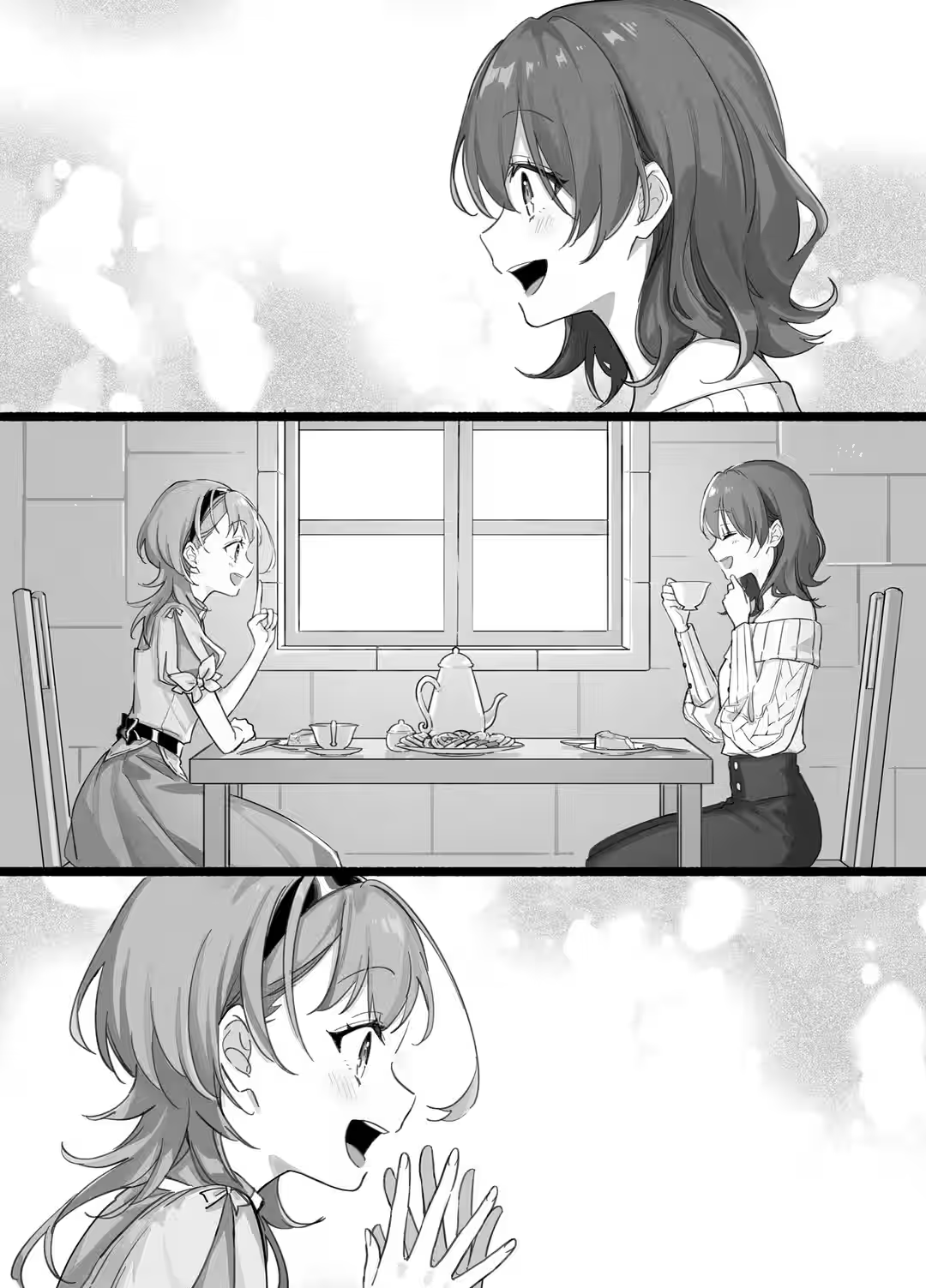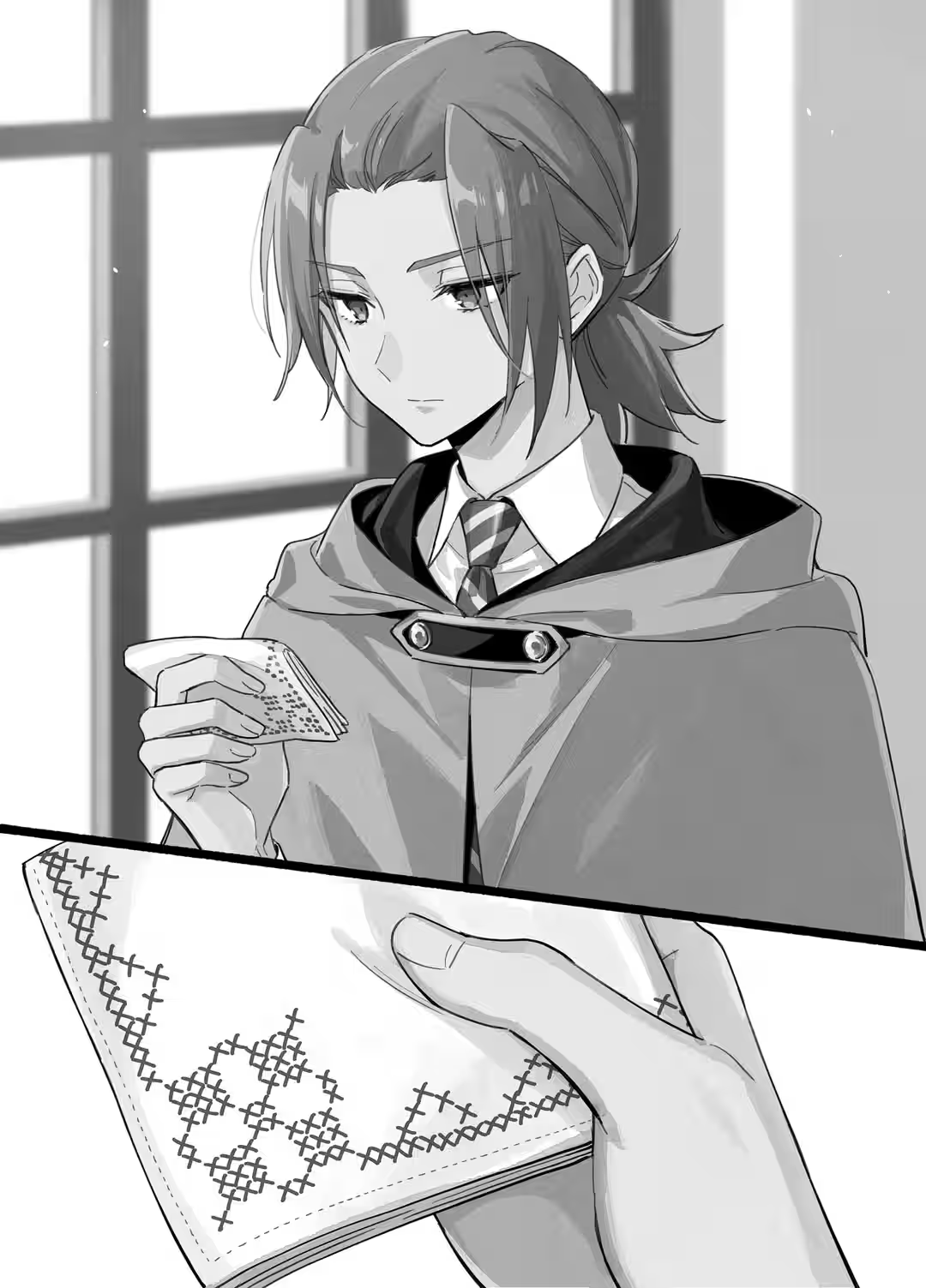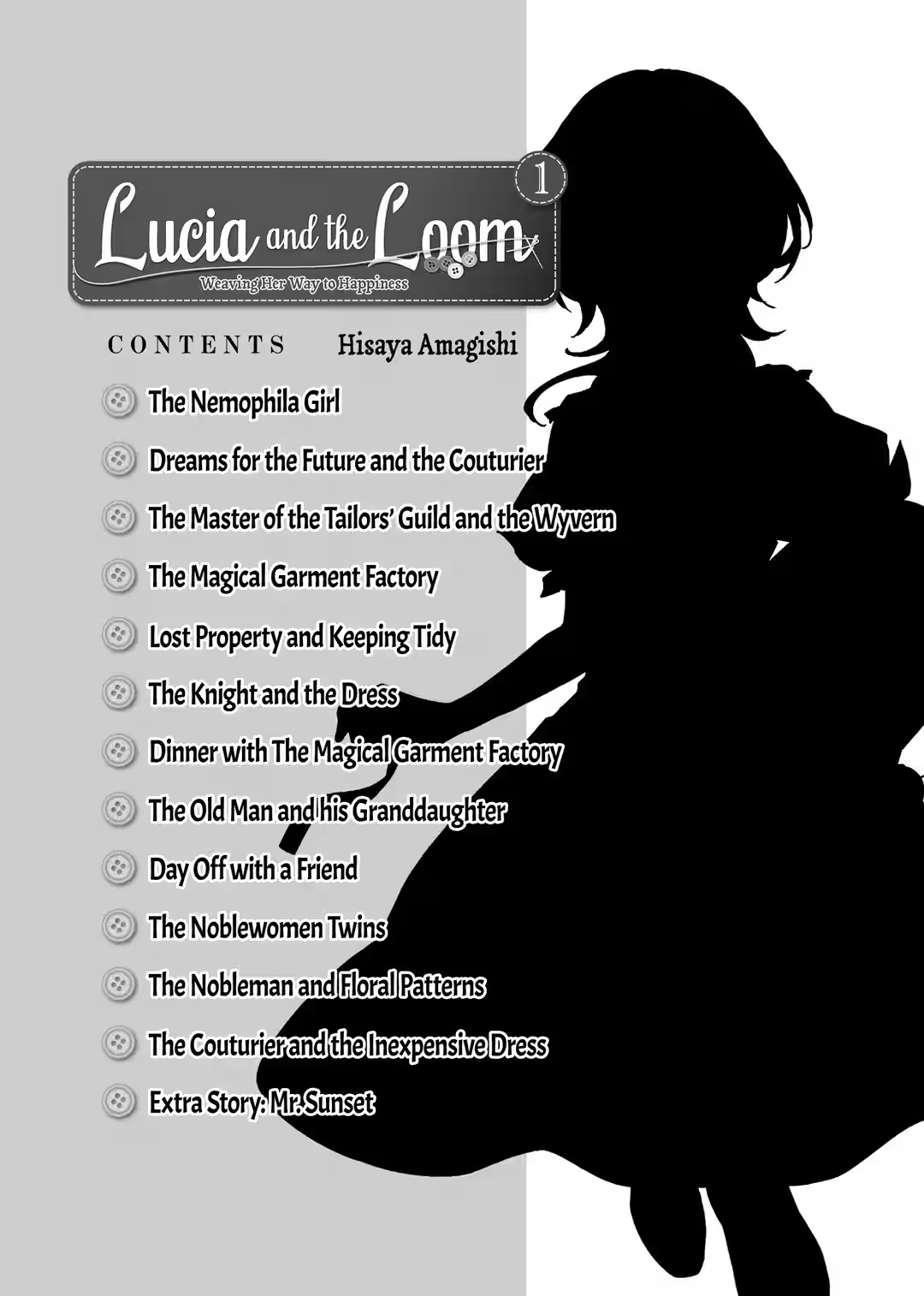

The Nemophila Girl
Life was preposterous. Lucia Fano, age six, knew that much for a fact.
The Kingdom of Ordine was said to be the largest and most prosperous nation on this continent, and the royal capital was said to be the most charming and splendid of all its areas. However, capital-native Lucia was born with deep green hair and eyes of oversaturated blue; her skin was pallid, her stature slight, and her looks modest and unremarkable. Dahlia, a friend who lived near Lucia’s grandmother, was a girl with red hair and bright green eyes. When she smiled, it was as though her namesake flower had blossomed. A slightly older playmate of theirs, Irma, had glossy hair the color of black tea and eyes to match, if slightly redder in hue. Her dexterity was exhibited in the braids she did herself, and she was very pretty. The girls around Lucia, every single one of them, were bolder, prettier, and cuter than herself.
Lucia knew she was unassuming. But despite that, she wanted to be cuter and prettier, and so every day, she brushed her hair neat, washed her face thoroughly, and put on her freshly laundered blue dress. Yet earlier today, some boys playing in the neighborhood had said, “You sure are like a dayflower, Lucia.”
Dayflower: a weed, small, blue, and forgettable, one that grew out of the cracks in an alleyway—how mean! But Lucia had failed to voice how much the comparison had irked her, instead running away with tears in her eyes. She was frustrated at herself for not having been able to say anything in response; she hated that about herself. She would’ve rather been blessed with height, gleaming blonde hair, and rare purple eyes. She would’ve rather been a beauty whom others compared to a rose or a lily. If only that were the case, then she would be able to wear the cute clothes that she wanted to. She would look good in the lemon yellow dress with white lacing her maternal grandmother suggested. She would look good with a long, glossy blue ribbon and a pair of red shoes with flowers all over. But she knew she would never be a girl who looked good in cutesy fashion like that.
“How preposterous.” That was a word Lucia had heard her father mutter under his breath yesterday. She had asked him what it meant, and he’d replied that it was “when things don’t make sense and you won’t stand for it.” To describe her as a dayflower was to say that the cute clothes she loved wouldn’t fit her. If that wasn’t preposterous, then she didn’t know what was. It wasn’t as though the boys had been picking on her, yet her vision was getting blurrier by the moment. Going home now and letting her family see her in tears would only make them worry, and so Lucia headed down the alley a stone’s throw from her home.
Once the evening sun dried her tears, Lucia would leave, go home, and wash her face—so she decided as she squeezed past the white walls of a warehouse. However, she realized someone had beaten her to the punch.
Though it was spring, the man had on a hooded black cloak, and he was perched on a stoop in the alleyway—perhaps he was one of those people called “perverts” that Lucia’s family always warned her about? She thought she ought to turn back while she had yet to be discovered, but the man pressed one hand against his nose and then proceeded to sniffle. It looked like there was already someone occupying the crying corner.
Lucia dug through her pockets and, after overcoming her hesitation, sped toward the man with a handkerchief clenched in her fist. “Here, please take this!”
He must’ve not noticed Lucia at all—he shrieked. “Whuh?! Oh.” His suntanned skin and tea-brown hair appeared for a split second before disappearing under his hood again. He had also shown his tea-brown eyes, which exposed the fact he had been crying. Though she couldn’t tell for certain through her own veil of tears, he seemed to be slightly older than Lucia’s brother, who was four years older than her. The young adult pulled his hood back down and refused the handkerchief. “Thank you, but I wouldn’t want to soil it.”
“It’s okay; I have two!” Lucia had to carry at least one lest she use her sleeves and dirty them, as there would be no excusing herself when her clothes got washed. She laid the white handkerchief on the youth’s knee and sat down on a step a short distance away from him. Then, Lucia took the second one out of her pocket, scrubbed at her eyes and cheeks, and assaulted it with her snot; she planned to secretly wash her hanky when she got into the bath tonight.
“Very well, then. Thank you.” He dabbed at his face underneath his hood, then blew his nose thrice with vigor; it caught Lucia off guard and even made her forget she had been crying. “Sorry for getting your handkerchief dirty. Would a silver piece be enough to cover it?”
“That one was just for practice; you can have it.”
“Sorry—practice?”
“Embroidery is a part of our family business.” The handkerchief she had given him was one of the ones she’d started out with. The Fano family ran a workshop that made socks and gloves, so Lucia had been practicing the craft since before she entered primary school. She wanted to make beautiful artwork like flowers and birds, as her mother and grandmother did, but at the moment, she barely had her cross-stitch down. As such, the handkerchief in the young man’s hand was littered with blue crosses.
It seemed like he was looking down at his new present, though she wasn’t certain, as she couldn’t see past his hood. “Such beautiful handiwork, and I’ve ruined it. Please forgive me.”
“It’s beautiful? You really mean it?” In her excitement at being complimented, her attempt to speak politely had come crashing to a halt.
He continued with the same calmness. “Yes, truly. Your stitches are so uniform. See, when my mother tried to do needlework, her handkerchief came out like a bag without an opening. It’s amazing that someone your age is capable of so much.”
The young man’s words brought a smile to Lucia’s heart, but she worried for him as well. “Does it hurt somewhere? Or did someone yell at you?” It was possible that he was a new neighbor whom she hadn’t met before. Perhaps he had come to the capital to make money. In every trade, there were many apprentices his age, and maybe his family or his master had yelled at him, he was feeling homesick, or he had gotten in a fight with his siblings or friends—there were endless reasons that would make a kid cry, just as her friends had said something to make her cry.
“No, uh, the crespelle I bought at the stall was a little too spicy. That’s all,” he said, his voice cracking. Must’ve been one spicy crespelle.
Crespelle were thick wheat crepes with various ingredients inside, all wrapped up into a rectangle. There were many choices too, like vegetables fried with meat; chopped prawn, octopus, squid, or kraken; onions sautéed with herbs; and even cubed fruits with a drizzle of honey. Different stalls offered different fillings and sauces, and with the endless combinations, there was no getting bored. Lucia often visited the crespelle stalls as well—she had them with a bowl of leftover vegetable soup for lunch or dinner when her family was too busy with work.
“Too much hot mustard?” she asked sagely.
The youth paused for a moment. “Yeah. Guess so.”
“Yeah, that happens to me too. Next time, you’ll have to try it with tomato sauce or even just salt.”
“I’ll keep that in mind.” He pulled his hood down with his fingertips after a breeze shifted it, and, with some hesitation, he asked, “If I may ask, what got an adorable little lady like you crying?”
Lucia froze. “Adorable little lady” were words that no one had ever used to describe her, and she felt herself blushing. She wasn’t sure if she should tell him the truth or not, but she decided to be honest with him as he had been with her. “Someone said I’m like a dayflower.” As the words tumbled out, her tears were about to do the same.
“Dayflower?” the youth repeated, as though he didn’t quite understand.
Well, she supposed he wouldn’t without any sort of explanation. “A boy who lives around here said that I’m like a dayflower. My hair is green and my eyes are blue, and I guess I’m small and boring. But it’s not like I asked to be born like this. Dresses with white lace and pretty ribbons won’t suit me, and that’s just preposterous.”
“Preposterous, you say?”
“My dad said it means ‘when things don’t make sense and you won’t stand for it.’”
“Yeah, I suppose many things in life can be preposterous...” He put his hand to his mouth and cleared his throat. “Well, I think dayflowers are cute. Besides, if you want to wear clothing with lace, then who’s to say you can’t?”
“I know I won’t look good in it...” When she imagined herself in that dress, her voice shrank and there was a prickling feeling in the back of her nose.
The young man’s voice grew, however. “You know, I think you’re more of a nemophila.”
“What’s that?” Lucia tilted her head quizzically; she had neither heard of nor seen a flower by that name.
“They’re blue like the sky. A ways down the eastern highway, there’s a place where they grow as far as you can see, making you wonder if you were looking up instead of down. They may be short little flowers, but they’re the prettiest of them all,” he said with a terrible longing in his voice.
Nemophila, the blooms that turned earth to firmament—Lucia couldn’t imagine what that’d look like. As someone who lived in the capital, she had seen large gardens and courtyards before, but never a field of flowers that stretched beyond the horizon. She had never even imagined a patch of sky blue flowers before.
He continued, “If you say you won’t look good and just give up here, you’ll never be able to wear that dress, you know? Pay no mind to what others think and wear what you like to wear. I’m sure both lace and ribbon would be perfect on you.”
It was as though his voice was reverberating in her chest. Lucia knew he had a good point. She had indeed already given up before even trying. She was feeling sorry for herself, having convinced herself the clothes she wanted to wear wouldn’t suit her, and those words struck deep. The cute clothes she so loved and that pretty ribbon she so wanted to put in her hair were right before her, yet she hadn’t been able to try them on or even reach for them. Lucia worried about how others would think, how others would laugh; she’d hate to be made fun of. But simply giving up here and now would mean that ribbon and those frills would be forever objects of desire, never to be within her grasp.
Lucia was done being a coward and done feeling sorry for herself. “Do you really think I’m like a nemophila? Do you really think I’d look good in lace and a ribbon?”
“I do. I’ll be your guarantor.” When the youth gave her a firm nod of the head, his slitted eye, imbued with the setting sun, had been laid bare for a split second, causing Lucia’s heart to skip a beat.
She knew not what kind of flower it was, but at that very moment, she knew she wanted to become a nemophila-like person.
The two of them fell silent for a while as numerous shadows fell onto the alleyway and crows cawed in the distance. The sun burned a deeper red now, and perhaps it was time for her to fly back to her own nest.
“It’s getting late. Allow me to take you home,” the youth said as he slowly rose to his feet. He turned out to be even taller than her brother, and Lucia had to crane her neck to see all of him. “May I take your hand, milady?”
“Oh, um, I’m fine! I live really close by!”
“Then I shall take you close to your residence.”
Was this the so-called “escort” thing that she had only ever heard of from her mother and grandmother? “Th-Thank you. Very much.” Lucia timidly placed her fingers onto his outreached palm and shuffled out into the street. The shadows were at their longest as he carefully matched her stride; she had never known a single person so courteous in her whole life. It was all too disappointing when they reached home quickly.
“Are you sure you’ll be fine from here?”
“Mm-hmm! Thank you and see you, uh...”—it was now that Lucia finally realized she had never asked for his name, and in all the excitement and nervousness of her first time being escorted, she could but blurt out what she saw in those eyes, which looked to be signaling the end of the day—“Mr. Sunset!”
“Mr. Sunset...” He laughed for the first time as the daylight painted him red; those thin lips of his drew a perfect arc. “I hope to see you again as well, Lady Nemophila.” The youth pressed his right hand to his left shoulder and bowed ever so elegantly before disappearing into the dying light. She pursued him with her eyes for as long as she could.
Feeling as though she had just lived through a dream, Lucia entered her red brick home to immediately find her brother.
“Oh, hey, Lucia. I was just about to go get you; it’s almost dinner.”
“Maxy! Show me your illustrated guide!”
“What, the one for plants?” asked Massimo, four years her elder and with the same rich blue eyes.
As he had an interest in vegetable dyes, he had bought this very precious illustrated reference guide to flora. Quality, heavyweight papers were bound between covers with woodcut linework, then hand-painted in color, making for a very high-end product the likes of which did not see much ownership among the common folk. With vim and vigor, Massimo had toiled in the family factory for half a year, then invested all his hard-earned money into this book.
Lucia was curious about a specific flower, and she pleaded to borrow his prized possession. He agreed on the sole condition that she look with her eyes and not her hands. When they entered Massimo’s room, he donned a pair of white fabric gloves before taking the flora reference book out of its case and staggering with it back to his sister.
“So? What kind of flower are you looking for, Lucia?”
“Nemophila!”
“Oh, yeah, it’s in here somewhere.” Massimo flipped to the index and quickly found the entry. “Here it is—an azure flower that blooms in springtime.”
There it was in the middle of the page, the flower with a center of white that turned to blue at the tips of each petal. The depiction of the three stems was indeed cute but hardly striking—how alike they were, Lucia supposed. But just as she let her shoulders slump, Massimo flipped the page, revealing a double-spread of a field of nemophila against the backdrop of a bright, blue sky with the sun hanging above.
“It’s so pretty!”
“What a sight. It looks like there’s a patch of them along the eastern highway. Says here, ‘A top sightseeing choice situated near coaching inns, perfect for traveling couples’—aw, come on! I spent a fortune on this illustrated guide only to find it has this junk in it...” Awkward as he was around girls, Massimo sounded a little dispirited, but Lucia’s mind was elsewhere.
Perhaps the anthologists really liked nemophilas, or perhaps they were advertising these tourist attractions. Whatever the case, as she regarded the sky and field of blue, Lucia’s heart turned bright and sunny too. They were not boring. They were small but absolutely adorable. They were beautiful. They were the most fabulous flowers she’d ever seen.
“Apparently, it means ‘lovely’ and ‘success’ in the language of flowers. Two completely different directions, if you ask me.”
Though he seemed to find it confusing, Lucia found it wonderful—what could be better than finding success while dressed in lovely, cute clothes? That had to be what she wanted.
Massimo turned to his sister, who was grinning from ear to ear, and asked, “What’s up with the sudden urge to look up nemophila? You wouldn’t have seen them nearby.”
“Someone told me I seem like a nemophila flower!”
“Huh?” His eyes shot wide. He didn’t bother to close the book before clarifying with her, “Lucia, who said that to you?”
“A gentleman I’ve never seen before.”
“What?!”
Afterward, Massimo interrogated Lucia about the details, then informed the rest of their family, who in turn warned her not to speak to strangers in quiet, empty places or loiter outside when it was late. They even forbade her from going alone into that alley again. Despite Lucia—with her brother in tow, of course—repeatedly waiting in the alley and hanging around the area, she never saw that young man again.
“Maybe Lucia was just dreaming,” her family whispered to themselves as they fretted for her safety. But she knew it had been no dream. That man had been there and said what he did. Since that day under evening glow when she had been told she was like a nemophila, Lucia had made a resolution to herself: to wear the clothes and the hair accessories she so loved and to love what she wore, no matter what opinions others may have. Just as Mr. Sunset had said, she was determined not to use others as an excuse to give up.
Though there was one regret that pained her every time she revisited that memory. “I should have asked for his name...”
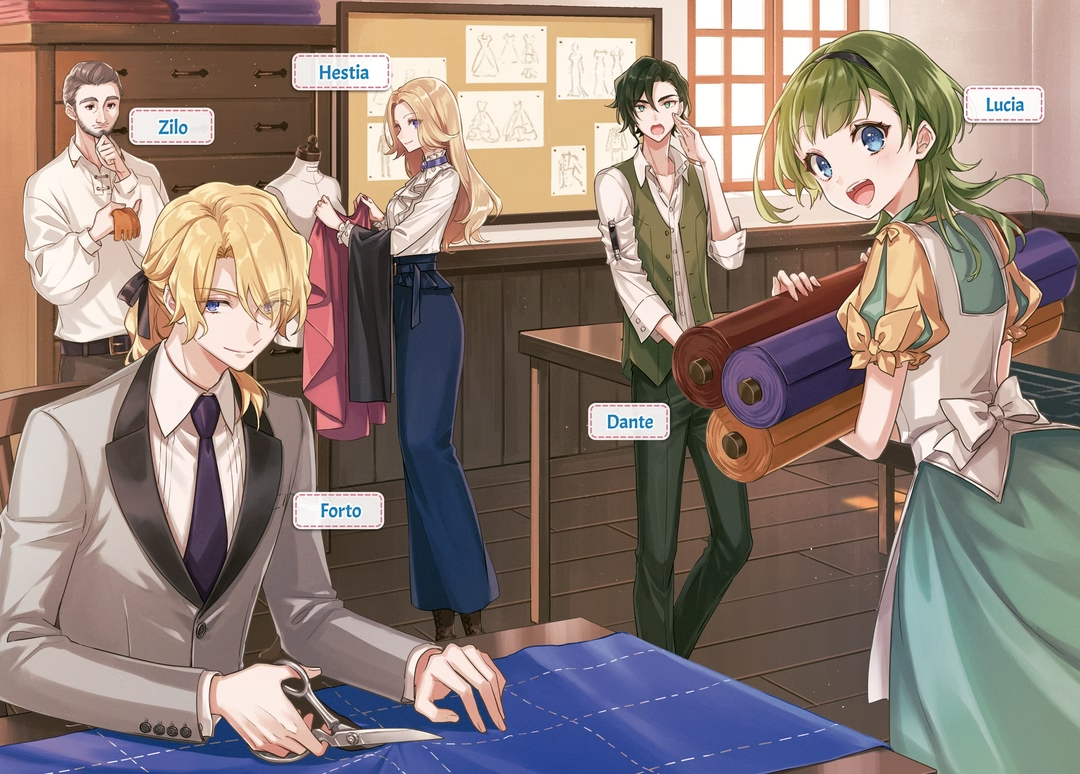
Afterward, they cleared a workbench and toasted with wine. They ordered food from the eatery downstairs to celebrate the winter festival a day early—and to commemorate Lucia having become a full-fledged clothier.
“This is the first time someone has ever put so much thought into making clothes for me. You’re ready, Lucia—be proud and declare yourself a couturier. Remember, though, that this is only your first step on a long, steep path uphill.” Ranieri mixed words of encouragement into his praise, perhaps unsurprisingly.
The suit Lucia had made him was certainly designed well and finely detailed, but it was nowhere near the level of the clothes Ranieri usually wore—that much had been obvious as soon as he put on the outfit. She swore to herself that the next time she gave him a present, she would make something that suited him better.
As they dined, Ranieri sang her praises, saying how comfortable and beautiful the suit was, and they shot the breeze. Then, a sudden announcement: “I’m departing for the Eastern Kingdom next week, by the way.”
“Excuse me?” asked her father.
In the same instant, Lucia asked, “For pleasure?”
Ranieri’s smile turned his eyes as thin as thread. “The silk and needlework over there are amazing, you know? I’m thinking I’ll take my time and tour the country.”
“And just how much time are you planning to take?” asked Rubert.
“One year? Perhaps three? Who’s to say? Since it’ll be an extended trip, I’m hoping to see Išrana and Ehrlichia as well. One day, I hope to travel the world and see what everybody wears. I’m not getting any younger, so it’s now or never.”
“What about your studio?”
“I think I’ll close up shop and turn it into storage; the people downstairs can use the space. I’ll let the cloth merchant handle my fabrics.”
Lucia said, “That’s quite the sudden trip...”
“I unexpectedly managed to snag a ticket for a sailing ship to the Eastern Kingdom. Oh, Lucia, you take some of my tools, fabric, thread, and mannequins off my hands.”
“I don’t need any of that—just don’t go!” was what she wanted to say. But Ranieri was the same age as her father—better to take a long trip abroad now rather than later. What she did say was “Please tell me when your departure is. I’ll come see you off at the port.”
“No way, Lucia. I’m not ready for the waterworks.”
“I’m not going to cry!” she asserted, already in tears, but perhaps that was because of the wine. Lucia polished off the remnants of her glass and bellowed, “I’m going to see you off with a smile!”
“Lucia...” Ranieri fixed his black eyes on her and displayed a pained expression before reverting to his usual sunny smile. “The one who will be crying is me.”
In the end, Lucia did not see Ranieri off when he set sail for the Eastern Kingdom—as luck would have it, the Fano Workshop had been hit with a huge order and she did not have the time to spare.
“Do you think Ranieri is going to write us letters, dad?”
Rubert sighed at the knitting machine. “He’s not much of a writer. I don’t think I’ve ever gotten a single letter from him before.”
Much later, Lucia received parcels addressed to her, like a sign of Ranieri’s successful embarkation: a familiar mannequin, sewing basket, and a chest of drawers—still filled with fabrics and threads—that barely squeezed into her room. It had been years since she last saw him—he could’ve at least sent a short letter or even a greeting card, she thought as she dug through her new gifts. She froze up when she opened the leather sewing basket. There it was, a pair of scissors with mythril plating on only its blades, the pair that was always tucked against his chest inside his jacket’s inner pocket. Her tears fell as she grasped it in her hands, and she wiped them away with that white monster silk square—her treasured handkerchief.
“Once Ranieri comes home, I’ll make him a dashing three-piece suit. It’ll look even better on him, fit him even better!” Lucia swore to herself. That way, she would shock him by demonstrating how far she had climbed up that long, steep path.
Since then, Lucia had gotten numerous chances to work at other factories too. She had a simple reason for taking those opportunities whenever they appeared: money. The Fano Workshop dealt mostly in socks and gloves—maybe vests and sweaters once in a while, but usually garments that weren’t highly priced and didn’t sell in large quantities. The family business put plenty of food on the table, but Lucia now had a dream.
Every time she had visited Ranieri’s studio, there had been different dresses out, but they had always been lovely. Every time she passed by display windows on the street, her heart raced. One day, she would have her own atelier like Ranieri’s and a store to sell the clothes she made—that was Lucia’s dream. The most conservative estimates she came up with were still extravagant sums far out of her reach, but that was no reason to give up. Ranieri had taught her: no matter how long and steep that path was, keep walking and someday she would reach her goals.
There was one more thing. Whenever anxious thoughts of inadequacy and powerlessness filled her heart, she vividly remembered a voice calling out to her. “If you say you won’t look good and just give up here, you’ll never be able to wear that dress, you know? Pay no mind to what others think and wear what you like to wear. I’m sure both lace and ribbon would be perfect on you.” So Mr. Sunset, that boy in the alley, had said.
She was no longer the weeping dayflower she had been. She wore ribbons in her hair and lace on her clothes, and she followed the path she wanted for herself—she was a nemophila. Giving up was no longer an option for Lucia.

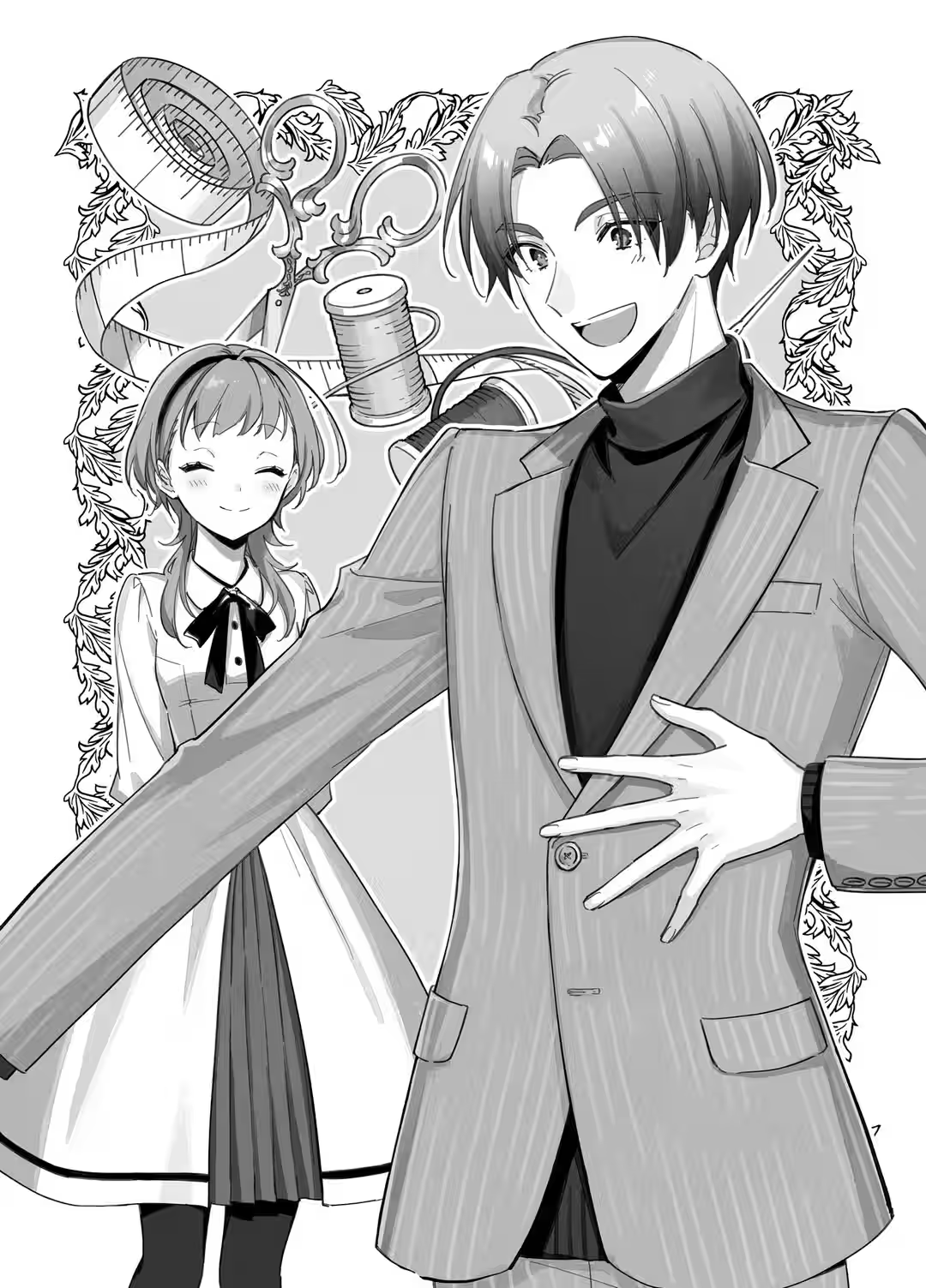
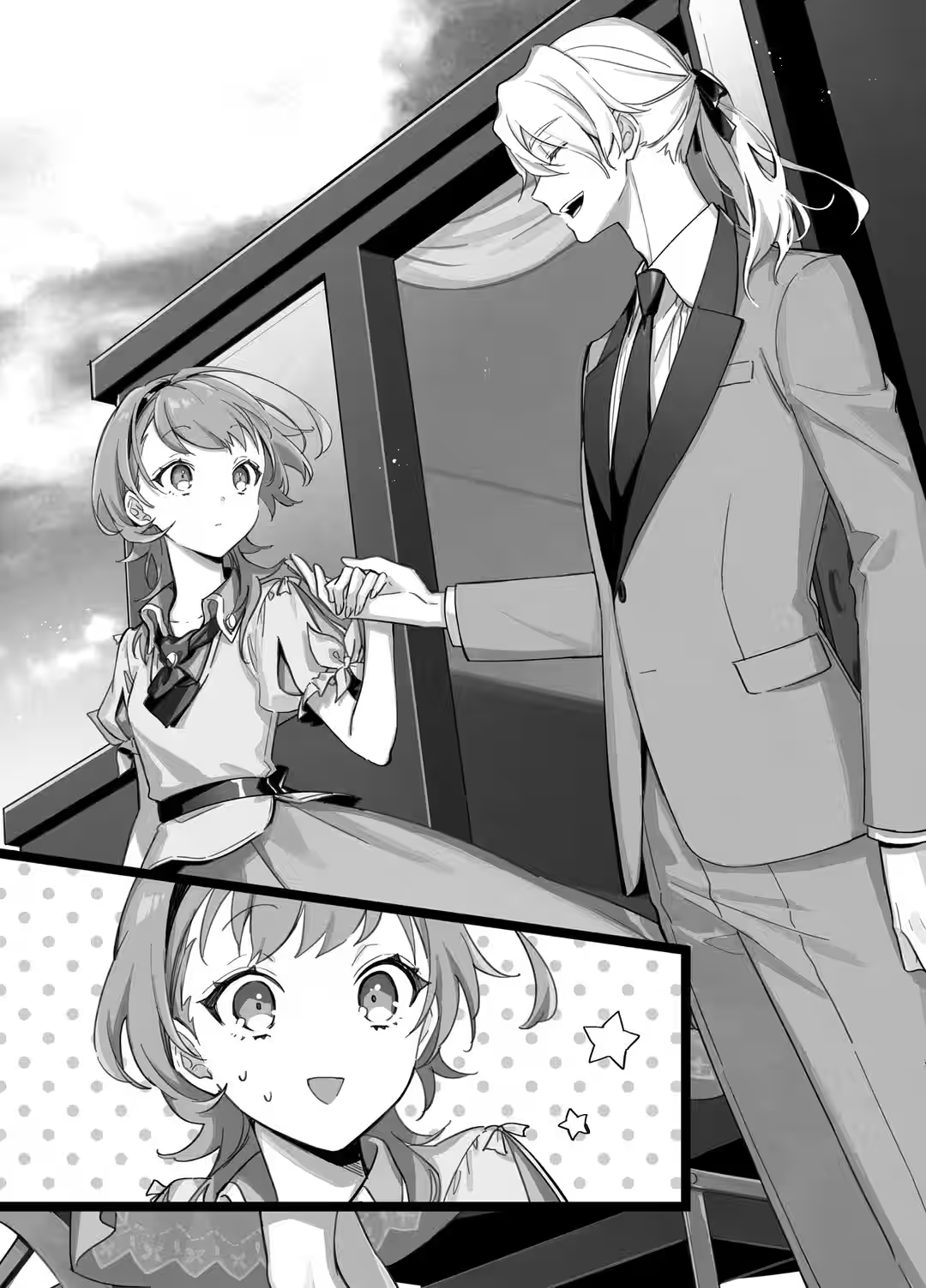
“Tell me he wasn’t a high-ranking nobleman. In any case, he should’ve known that the heels of different shoes are different...”
“I wanted to shout, ‘Just because you’re the same height doesn’t mean your heels are all the same height!’”
“For real!”
This time, Lucia poured for Dante, who had to slurp from the rim of his glass before he could pick it up. He said, “It wasn’t like I made the suggestion so he would pay me more for labor—I just wanted him to look halfway decent!”
“Some people, right?! There was a noblewoman whose color was vermilion, but despite loving it, she didn’t want to be too flashy, so she wore really light pink and tried to pair it with something blue.”
“What a shame! There is nothing cohesive about that at all!”
Kindred spirits—that was the only term for those two. Forto didn’t want to interrupt, but the conversation sounded rather interesting, and he slowly made his way to the table.
“Mr. Forto!”
“Mr. Fortooo!”
Both of them noticed him before he could greet them. Lucia shifted one seat over so that she and Dante flanked Forto. Without asking, she then put down a fresh glass, which Dante filled with red wine. It seemed that Forto wasn’t interrupting them after all.
“You two seem like you’re having a jolly time,” said Forto.
Lucia replied, “Oh, yes, we were just talking about pant and skirt lengths!”
“That is very much a couturier’s thing to care about.”
“And also clients with no sense of fashion!” added Dante.
“I sincerely beg that you two keep the contents of that conversation between you...” Forto was so glad he had booked off the whole floor today. It was rare to see Dante this inebriated too.
Lucia included her boss in the conversation. “You’re a couturier too, Mr. Forto—is there anything you just don’t understand or any outfits that bug you?”
He loosened his collar. Fortunately, no one here was tied—that was to say, no one here was relaying information to a noble family. Dante was from a viscountcy, but they had rapport and Forto trusted him enough, so this might be a good time to be candid. Forto said, “It bothers me that if the components of a man’s three-piece suit don’t match in both color and material, it is said to be unbecoming and improper.”
“Is that right? That would be too casual?”
“Yeah, I’ve been called a ‘mannerless punk’ in a more formal setting before, but of course, they didn’t have the nerve to say that to my face,” said Dante.
“A darker waistcoat helps to slim the body, and having one part of your outfit in a slightly different shade is quite stylish. Of course, it would not be suitable for a wedding or a funeral, but I can’t see why it would be disrespectful in any other situation.”
Once upon a time, when Forto had just entered the Tailors’ Guild, he had made an ass of himself by visiting a high-ranking noble’s estate while wearing a darker vest. The nobleman’s missus had taken Forto aside and pointed out the problem. Then she had even covered for him and told her husband that Forto had ‘gotten sick from the carriage ride and couldn’t change before coming.’ The incident had cemented in him the idea that noblemen ought to have more freedom in their dress.
“Hm? Mr. Forto, the silver-gray three-piece you usually wear features a waistcoat in a darker shade, does it not?” asked Lucia.
“Yeah, it’s literally one shade darker on the color chart, isn’t it?”
The two couturiers seemed to be really invested in this; bashful he was to be stared at, but nothing could have pleased him more as a professional in this trade. “Indeed. But it’s not a problem so long as nobody notices.”
“Our guildmaster is so clever!”
He had finally drained his glass, but it was once again filled with wine. It was quite timely too, as a platter of cheeses and salami and a basil pizza, one of Forto’s favorites, arrived almost immediately afterward—likely by arrangement of his attendant. Forto helped himself to the food, then continued, “In a different way, I have been curious about the state of men’s socks as of late.”
“In what way?”
“Is it because the toe socks aren’t very pretty?”
“No, the toe socks are functionally elegant.” Truth be told, he had been a little disgusted the first time he had seen the toe socks; they looked like a monster’s shedding, and he had felt that they were less than acceptable. However, when he put them on, he had learned that they were like gloves for feet. They were so comfortable to wear and walk around in, and they made the wearer so much more comfortable as well. Thereafter, Forto had come to see the toe socks like a pair of gloves—a necessity with elegance in its functionality. “Rather, the length of socks has been bothering me. As you know, short socks are popular this summer, but a man will show his skin when he crosses his legs. Do you find that unattractive as well?”
“I see you prefer over-the-calf, Mr. Forto,” Lucia said.
“It doesn’t bother me; I think shorter socks have their place in the summer, as they’re just a little bit cooler,” said Dante.
Unlike the former, the latter did not understand. But think about it—“A man sits down in his perfectly ironed trousers, his shoes gleam brilliantly, and then his leg hairs stick out—surely that’s absolutely out of line?”
“I-I see...”
“Oh...”
The visual aid must have helped both of them. Having established his idea, Forto elaborated, “The only thing worse than wearing short socks is not wearing any at all with a pair of dress shoes.”
A pair of leather shoes took hours to craft—many more than clothing. Not only that, it took time to break in as well. To knowingly damage the shoes and forgo socks was blasphemy.
He continued, “If you want to go barefoot, try sandals.”
“But there are people who wear leather shoes without socks, like my grandpa and my friend’s father. Once the drying insoles get popular enough, wearing dress shoes barefoot might just become a trend,” said Lucia, telling a horror story.
“Gods, I hope not...” Perhaps a toe sock and drying insole set ought to be marketed toward men.
As Forto took a bite of his second slice of pizza, Dante filled the other man’s glass. “Since we’ve got such good company here tonight, can we talk about colors for a moment?”
“By all means. How about what colors noblemen ought to avoid?”
“What colors are those?” Lucia looked as though she was filled with equal parts curiosity and skepticism.
“A gentleman’s shoes are black or brown—this is a topic noblemen mustn’t touch upon when political factions and hierarchy are at play.”
“Mr. Forto, are you sure you want to talk about that while I’m here?” Dante asked, his cold eyes lighting up.
“Sure, Dante. When else would I get the chance but today?” he said. “A gentleman’s shoes are black, but he has a choice from a deep black to a gray. Depending on what he wears, brown is a viable option as well, but it wouldn’t be suitable for anything formal, like a funeral, and therefore black is the gentleman’s color.”
“So, black is versatile...” Lucia muttered, hitting the nail on the head as she sipped her fruit wine. Formal situations called for black shoes, and in case of the unexpected, having around a pair of black shoes made of top-quality leather would protect its owner. Black was the color of the nobility.
“Leather shoes are made of leather, and leathers are originally the color of the hide they are tanned from. Dark brown shoes are sold at the same price as black shoes, there are many dyes to make leather brown, and they develop a fine patina with age.” The green-haired man heaved a heavy sigh as he looked at his shoes—well polished to a deep brown. “Besides, there are a lot more shades of brown than there are of black. It can be tinged with red, tinged with green, darker or lighter. There is so much freedom in brown—brown is the color for a nobleman’s shoes.”
“So, brown offers many options...” With both hands on her glass, Lucia took another sip of her fruit wine. Her eyes, evocative of the oceans, angled downward. Just as Forto thought she might have been swayed by Dante’s theory, she spoke. “Black and brown both encapsulate their own ideas and principles, and I doubt there will ever be one answer. I suppose that is also why people are proud of Ordine.”
Forto couldn’t exactly disagree, but she wasn’t very convincing.
Lucia then said, “How about this? Since you’re both couturiers, why don’t you two swap?”
“Swap?”
“Assistant Manager Cassini wears Mr. Forto’s choice of black shoes, while Mr. Forto wears Assistant Manager Cassini’s favorite brown shoes. Then, each of you tries to coordinate your own outfit with the clothes that you have. Every nobleman client has his own take on the issue, right? Wouldn’t it be great to be able to make a great outfit and to find more combinations that you enjoy?” She finally breathed again, then grinned. It certainly sounded like a fantastic exercise for a clothier to sharpen his senses. “Okay, I’m not going to lie—I just want to see Mr. Forto and Assistant Manager Cassini and your fashionable outfits!”
“And here I was thinking you had a great idea!” said Dante. Good thing she was too honest for her own good.
“Regardless, the idea sounds rather interesting, so why don’t we give it a try? If you would like to join me, Dante, I shall call a cordwainer.”
“Sounds good, Mr. Forto. Would you mind if I invite my go-to cordwainer to the guild as well?”
“Of course not.” Even Forto owned a pair of brown shoes. It was the obvious choice when visiting clients who liked the color. Pairing his own clothes with shoes that Dante chose—for someone who didn’t mix and match outfits, it seemed likely to be quite the learning experience. Not only did Lucia have a good sense for fashion, she was very clever and creative too. “Lucia, how about becoming an in-house couturier for nobles? I’m sure you would have clients lining up for your services.”
“Thank you, but no thank you—my dream is to own my own atelier someday.” Her expression may have been tired and drunken, but that innocent smile of hers couldn’t have been more genuine.
However, if Forto had a choice in the matter, he would rather she stay with the guild for a long time than start her own workshop; he did not want to lose such a brilliant couturier and manager. “Your own atelier, you say? Well, since you are the most familiar with the toe socks, I ask that you please become the Magical Garment Factory’s head manager.” Lucia stared blankly at him; perhaps she hadn’t heard him clearly. Or perhaps his request hadn’t been explicit enough—Forto wanted her not to be an interim but the official head manager. Before he could explain, though, someone else piped up.
“Head Manager Fano!” Dante—sitting to his left—slid his seat backward and leaned over behind Forto toward Lucia—sitting to his right. “Assistant Manager Cassini is far too long; please call me by just my first name.”
“Very well, Dante!” There truly was no couturier more suitable for the role than Lucia. It had taken her nary a moment to rally the team and to develop such great relationships with everyone. All three managers—Zilo, Hestia, and now Dante—had her calling them by their first names, and she did not hesitate to address them in like fashion.
“Glad to have you on the team, boss!”
“‘Boss’?! No, ‘chief’! Chief is good!” But Lucia would be shrieking in opposition soon. Days after this night, she would be pale in the face as she signed a contract that formally emplaced her as the official head manager of the Magical Garment Factory.
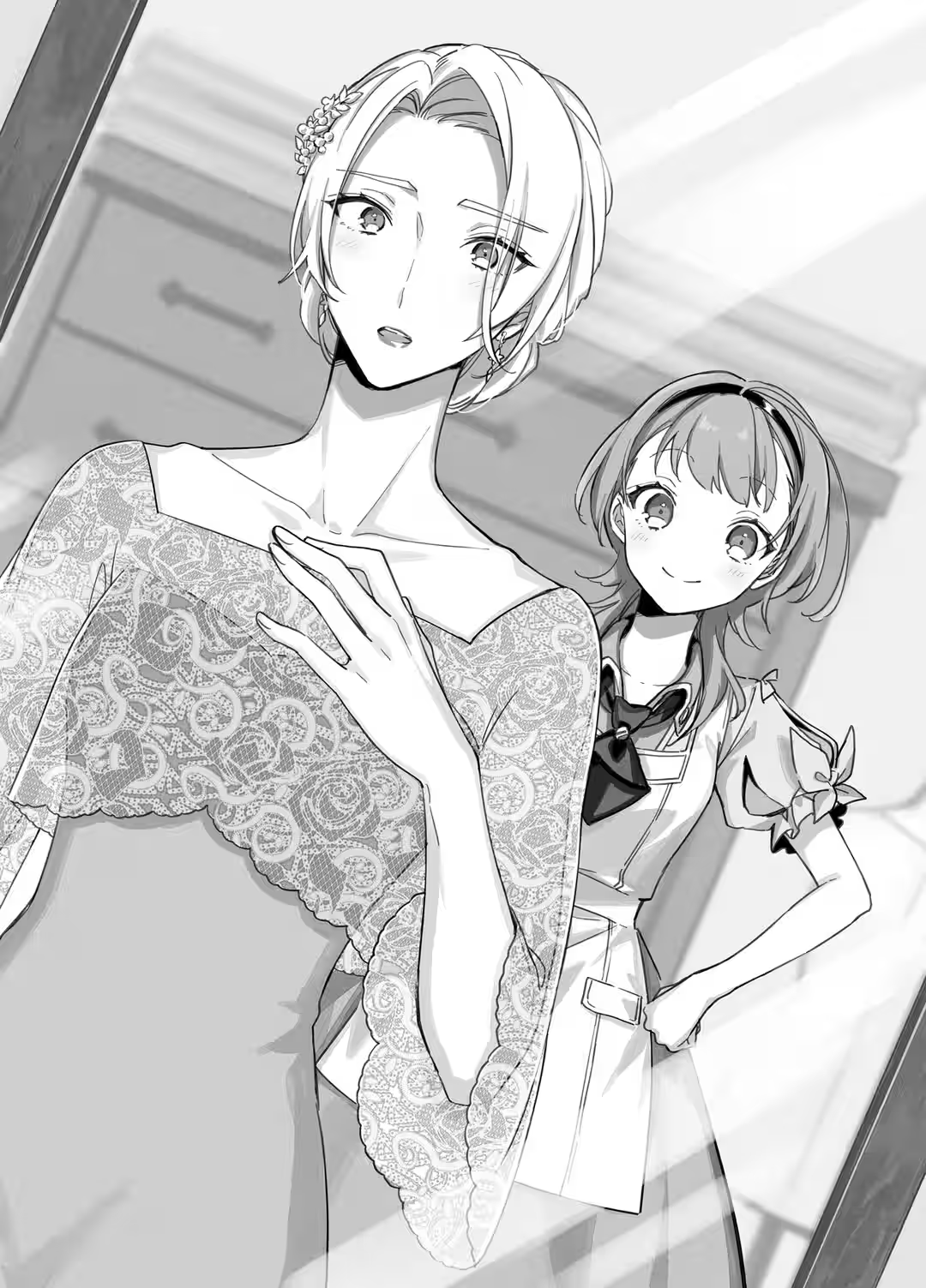
Day Off with a Friend
Central District was home to the most flamboyant fashion in all of the kingdom’s capital. Changing weekly, the storefront displays were both textbooks and art galleries to Lucia; every visit had her heart racing, her mind overcome with emotion. Clothes, shoes, accessories, and cosmetics of all designs and colors passed her by in the streets, and simply gazing upon the different combinations and outfits was one of her favorite pastimes. Over the past few years, foreign styles had begun to have a greater influence—furs and pelts à la neighboring nation Ehrlichia, numerous layers of fabric in the palate of the native rocks of desert nation Išrana, long sleeves and lustrous sashes from Esterland—and it very much fascinated Lucia.
This dazzling day found many shoppers gazing at summer styles in the shopwindows, some of which required a bit of confidence to wear given their lack of surface area, so to speak. They would certainly look great on Irma, but Marcella would most likely not be very happy with the suggestion. There had been a sharp increase in the number of shirt and blouse designs too—polka dots and stripes had been commonplace already, but now it was more common to see fish, mollusks, kraken, and even sirens emblazoned across the chest, making for quite the summery and unique trend. Maybe a slime-patterned top would make a great present for Dahlia.
There was so much beauty, cuteness, and playfulness in the designs here, but it was no time to stop and stare. Lucia hurried her steps, as she had somewhere to be—she finally had a day off today, and she was going to meet her friend.
“Lucia! Over here!” Waving to her was her redheaded friend, who was standing by a table at a restaurant along the street. The large beige parasol made it quite enjoyable to dine alfresco, but the shadow that it cast had hidden her friend.
“Dahlia! I missed you so much! Your outfit and hairstyle both look fantastic today!”
Dahlia had on a lily-white sweater, olive green pants, and white shoes with a bit of a heel. She wore her shoulder-length hair down; the red curls had a healthy shine and fluttered in the breeze. Both because she herself had never had much interest in fashion and because she had been accommodating her now-ex-fiancé, Dahlia unfortunately kept her appearance rather subdued. Maybe because she not only worked as a magical toolmaker but also as the chairwoman of a company that had business with the nobility, she had suddenly become so much more beautiful—Lucia was so happy to see the change.
“Do you have any recommendations, Dahlia?”
“The seafood spaghetti and chilled tomato soup are good here.”
“Okay, I’ll do exactly that with a glass of sparkling water. How about you?”
“I think I’ll have the chilled mung bean potage, but I can’t decide between the summer vegetable spaghetti or the mushroom and prosciutto pizza.”
“Why don’t you order the spaghetti and then we can split the pizza?”
“Let’s do that!” Dahlia’s response came a beat late—she took a quick glance down at her waist, but Lucia pretended not to notice. It was nothing that couldn’t be fixed by walking home instead of taking a carriage and eating a bit less tomorrow. “Has work been busy for you lately, Lucia?”
“It’s not not busy. But I’m glad to have it, and the pay is good. Besides, in my line of work, there are always ebbs and flows.” She explained that although they somewhat varied in number depending on the season, there were always sudden tailoring requests, rushed orders of formalwear, and fluctuations in order size, so it was consistently inconsistent. She worked as hard as she could when the Magical Garment Factory was busy, and when there was some slack, she scrutinized the products to identify areas for improvement. Dahlia understood it well—apparently magical toolmaking and development were the same. “Have you been keeping busy as well, Dahlia?”
“Yeah. I found someone who’s an expert at processing tools, and I’ve been doing some studying recently.”
“You’re a full-fledged toolmaker already, but you still have more learning to do? What, are you developing new ideas?”
“Postprocessing magical tools, like miniaturizing and lightening them, is rather complicated. There’s a lot of trial and error as well.” Being a toolmaker must be hard work. Just like being a clothier, there always seemed to be room to learn and grow—just as you thought you were halfway decent, a veteran or a specialist put you to shame.
“Oh, this is good!” The chilled tomato soup had the right balance of acid, salt, and a basil punch.
Dahlia seemed to be pleased with her choice as well; her eyes curved as she put her spoon to her mouth. It was at times like these that the errant thought came to Lucia’s mind: how she resembled her late father! Carlo had been a magical toolmaker and Dahlia’s master. Whenever Lucia had gone to the Green Tower to hang out, Carlo was there with a smile to receive her. He had always complimented her on her hairstyle and clothes, bringing a smile to her face as well. Though a baron, he had never once been pompous; rather, he had always been kind and amiable. Lucia couldn’t help but feel a little sorry for Dahlia now that she was alone. There was surely a lot he still had to teach her as his daughter and apprentice; he was probably cheering for her from the other side as she continued her never-ending quest to improve herself.
“Gosh, Lucia, look at the size of that pizza...”
Lucia looked up to find the two spaghettis and pizza arriving at their table. Not only was the latter a whole size larger than she had expected, it was completely smothered in toppings and overflowing with cheese, as if to say that today was customer appreciation day. “It’s, uh, it’s fine! We’ll walk home today!”
“You think you’ll be able to move after eating all of this?” Her cold green eyes froze Lucia’s lips shut.
As Lucia cut the pizza, she explained that they’d take their time window-shopping afterward. “Oh, I meant to tell you about the machines—we got a bunch of new ones, so production has been going swimmingly. I think we can up our production very soon and cut prices for next year.” Unless they could increase production and lower costs for both the toe socks and drying insoles, they would never be products for the common folk. Lucia was wearing the insoles this very moment, and the more she wore them, the more she learned to appreciate them. The toe socks had received great feedback from the men as well.
“That’s great news. I had my doubts, to be honest—I was worried that I’d thrown all this trouble onto you, Lucia.”
“Not at all! Not only has my salary gone way up, I’ve got so many master couturiers looking over me, and I get to make new clothes, so thank you from the bottom of my heart.”
After bringing a smile to Dahlia’s face with her words of appreciation, Lucia took a big chomp out of her slice of pizza, and it punished the roof of her mouth for her impatience. She braved the scorching pain, and she was rewarded with the flavors of browned cheese, tender ham, and aromatic mushrooms. Maybe it was where they had been foraged or maybe it was because of the weather, but this year’s fungi seemed to be much more flavorful than the previous year’s.
Lucia continued, “The other day, I saw this lipstick and face powder made with kraken so that they won’t come off as easily.”
“Perhaps the face powder is made with kraken membrane,” Dahlia wondered aloud. “Oh, this lipstick I’m wearing is made with red slime. They said it makes it extra glossy.”
“I’ll have to take a look for it next time,” Lucia said with a big smile, for today was a momentous occasion: in the twenty or so years that she had known Dahlia, this was the first time she had been the one to recommend makeup to Lucia. “I’ve heard that lately, a certain fabric factory got themselves this great big magical weaving machine that’s two stories tall.”
“A magical tool that weaves? No kidding! I wonder if it uses crystals or monster parts.”
“I heard that it’s air crystals. Up until now, the superwide weaving machines have always been worked by people with body strengthening magic, but with crystals, even those who don’t have magic can use the machine.”
“Oh, I’d love to see one someday,” she said, daydreaming.
Just as Dahlia wanted to see the magical tool, Lucia wanted to see the textiles made there. “If I ever get permission for a tour, I’d love to bring you along.” The machine still needed more adjustments, as the warp and weft weren’t quite even, and with its sizable working width, it made sense that it ought to be as perfect as can be.
“Hopefully that means fabric will come down in price,” Lucia said.
Textiles were more affordable than ever. Back when her grandmother was still a child, they had been three times more expensive than they were now. It was the advent of spinning, weaving, knitting, and other machinery, as well as better access to raw materials, that had driven prices down. According to Max, dyes for thread and fabric were now produced in three times the volume too. Vegetable dyes were still just as popular, but insect, mineral, and monster dyes had become more commonplace. Imports of dye had also increased, with a vermilion from Esterland being the hottest thing right now. It wasn’t too easy to work with, but mastering it sounded like fun. The dye was apparently sourced from trees too.
“Say, Dahlia, do you know of any tree-shaped monster material? I heard that there’s this beautiful orange-red dye from Esterland that’s supposedly made from trees.”
“I’m wondering if that isn’t lacquer. Do you know if anyone has developed a rash?”
“Well, the Tailors’ Guild is all about safety first, so they process it and it’s fine,” Lucia said. “You do some dyeing too, right? What kinds of dye do you use for magical tools?”
“There’s this plant from Esterland called onirosso that makes an amazingly beautiful red and a durable finish, so it’s often used on furniture. Monster fish scales are also used, and those come in many colors, like white, red, and yellow.” Dahlia was a wealth of knowledge, and she always taught Lucia a lot. “I’ve heard that enchanting with griffin talon and wind dragon scale produces really great colors, but those are a little out of my reach...”
Lucia was sure that before long and hot on the heels of the waterproof cloth and toe socks, her friend would come out with more delightful clothing-related magical tools.
After quite a while chatting and eating, they had finally finished their meal; even Lucia’s second stomach for dessert had been filled.
“Ugh, I’ve been eating too much and gaining weight lately...” moaned Dahlia.
It probably wasn’t the best thing to say right after a meal, but Lucia wholeheartedly agreed—snacking while working certainly didn’t help. She had been taking lunch with other Magical Garment Factory members more often as well, and in the afternoon, Forto sometimes brought the cakes and such he got from his clients. Any leftovers were saved for snacks during overtime. In an ongoing war with her waistline, Lucia had been doing more push-ups and sit-ups before hopping in the bath.
“Once I get over this hump, wanna hit the sauna with me, Dahlia?” Saunas were a feature of the bathhouses scattered around the capital; older apartments didn’t have bathtubs or hot water dispensers, and stopping by the bathhouse after work was a nice way to relax. Saunas had quite the queues outside in the evening, as there were always patrons seeking health benefits and to lose weight.
“That’s a great idea, but I’m wondering if I couldn’t come up with a simpler alternative at home.”
The concept of “simple” was not compatible with the ideas of dieting and physique improvement, but Lucia held her tongue—her friend had never seriously worried about her figure before, so it would have been counterproductive to criticize a good habit. Then she contemplated—was there something Dahlia could casually do at the Green Tower? “How about going up and down the steps with heavier weights? Or maybe adding a sauna at home?”
“Yeah, I’ll try adding more weights. But installing a sauna might not be easy with the round walls of the tower, and it would be quite a waste of money, as I’d be the only one using it...” Dahlia pulled her purse strings quite tight considering how much money she made. She licensed out her waterproof cloth, and that provided her with a regular income, but she saved that money as a fund for developing new magical tools—and for her retirement. As an aside, she had first uttered the words “retirement fund” when they were fifteen, and Lucia remembered she had asked for an explanation. Dahlia was truly responsible.
Lucia saved money too, but it was for her future atelier and shop; she gave no thought to her golden years. “Oh, that’s right—was that long, thin roll of waterproof cloth for someone very tall?”
“You know how there are raincoats and rain pants? Well, I was thinking of combining them like a onesie, as I had a request for something that would keep the wearer completely dry. It didn’t really work, though.”
A suit made of waterproof cloth might be useful for people working in rivers and lakes, but there was a glaring issue. “Did water get in from the sleeves and from the neck?”
“That much was expected, and it was nothing you couldn’t fix by wearing another layer and fastening it with cords. The problem was with it getting really stuffy inside, like you couldn’t imagine by wearing just a raincoat. Sweat pooled around the hips. The client said that ‘wearing it was so much more tiring than not,’ and this was someone with body strengthening magic.”
“So, it’s a breathability issue?” The waterproof cloth repelled water; there was no miracle material that was both breathable and waterproof. “But it sounds useful! It’d be great for when you only need it for a short period of time!”
“Yeah, but it’s like a sauna suit...”
“Hey, that’s brilliant! You’d definitely get a sweat going if you wore it into the bath!”
“Um, yeah, sure...” Dahlia stared off into the distance; maybe she was coming up with an idea of how to sell it. She had always had such a wonderful imagination.
The sauna was just a small wooden room where people could relax in the steam, but if sweating was the point, then that waterproof suit might just work—it’d definitely be hot enough that you could sweat off some weight by wearing it into the bath.
“I’ll make a pair—one for me, and I’ll have the other one sent to you. I’ll tailor mine to fit myself before I test it.” Dahlia was taller and had longer limbs; what fit her would be too large for Lucia, so she’d have to find some time to make this sauna suit.
“Thanks, Lucia!”
It’d be easier for Dahlia to do the testing, but Lucia had a reminder for her. “Make sure you don’t stay in there for too long, okay?”
There was this incident back in their primary school days when Lucia, Dahlia, and Irma had first gone to the sauna together. Lucia and Irma had been defeated by the heat fairly quickly, but Dahlia had remained inside for quite some time. Worried, Lucia had gone back to check up on Dahlia, who had said with a bright red face that she was trying to stay in there as long as she could. Sweating was supposed to be the fun part, but she had made it into a self-imposed punishment. Lucia and Irma had poured water over Dahlia as they got her to rehydrate.
Dahlia blushed; she must’ve realized what Lucia was hinting at. “You don’t have to worry about that anymore, Lucia! I’ll make sure to set a timer!”
Days later, the redheaded friend asked Lucia whether she knew of any good ointments for sweat rash. A mere timer could not change Dahlia’s nature, apparently.
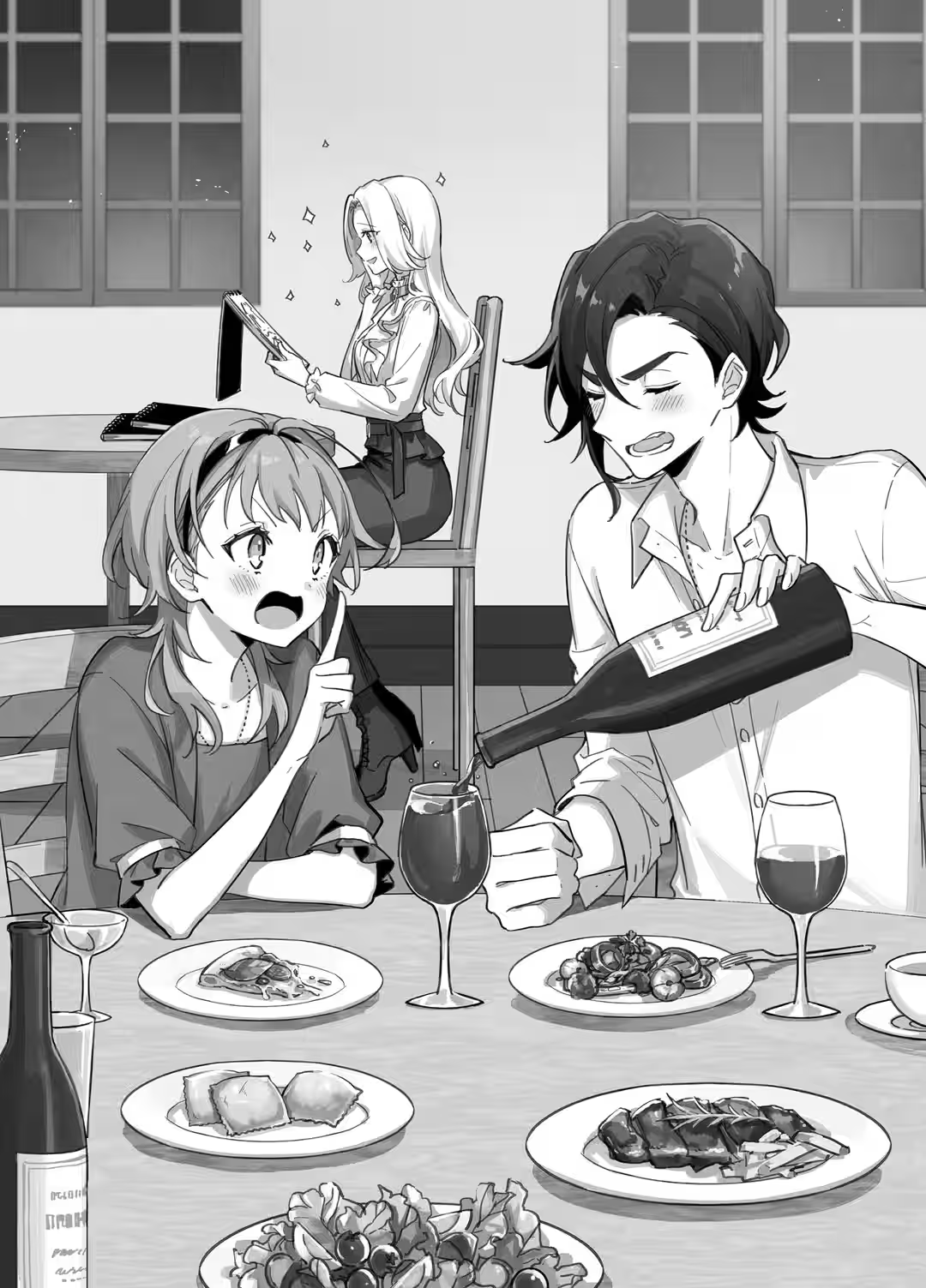
Forto tenderly took the hand she unwaveringly extended, and he mercilessly led her to the middle of the dance floor during the interlude. All the other noblewomen stared, but she pretended they were simply fawning over him.
She had one hand on his shoulder and the fingertips of the other in his palm, and she whispered, “Thank you very much for taking time out of your busy schedule for me, Lord Fortunato.”
“I would abandon my career if it meant a chance to dance with the beautiful Miss Delphina.” The way he said it so smoothly elicited a giggle from her.
“Ms. Lucia put you up to this, I’m sure?”
“Girls sure grow up quickly,” he responded with a smile, causing her to laugh aloud this time.
“You could say I skipped a few steps.”
“How so?”
Delphina and Fortunato danced to a conversation about Lucia—a dance most entertaining.
The two dances with Fortunato became a treasured memory of Delphina’s. Her brother-in-law Kirk that night and her parents the following morning asked about her relationship with Fortunato, which she explained by saying he was a work friend. There was some truth to it—she had received news that she would be sent to Ehrlichia to interpret, and when she was there, she had planned to buy a pile of sartorial literature to send back to Lucia and Fortunato. Her friends had also promised her they would explain and discuss foreign fashion with her over a cup of tea—Fortunato had been the one to tell her, but the idea had come from Lucia, apparently. “There are plenty of fish in the sea—be they men or women!” she had asserted; recalling it brought a smile to Delphina every time. Both Lucia and Fortunato were lovely beyond her imagination.
Delphina would soon be traveling to the neighboring nation. She was sure she would meet plenty of delightful people there. She would live a life of her own, give her work her all, and, if possible, develop a passionate romance. And one day, when she needed a red wedding dress, she would turn to her friends at the Tailors’ Guild.
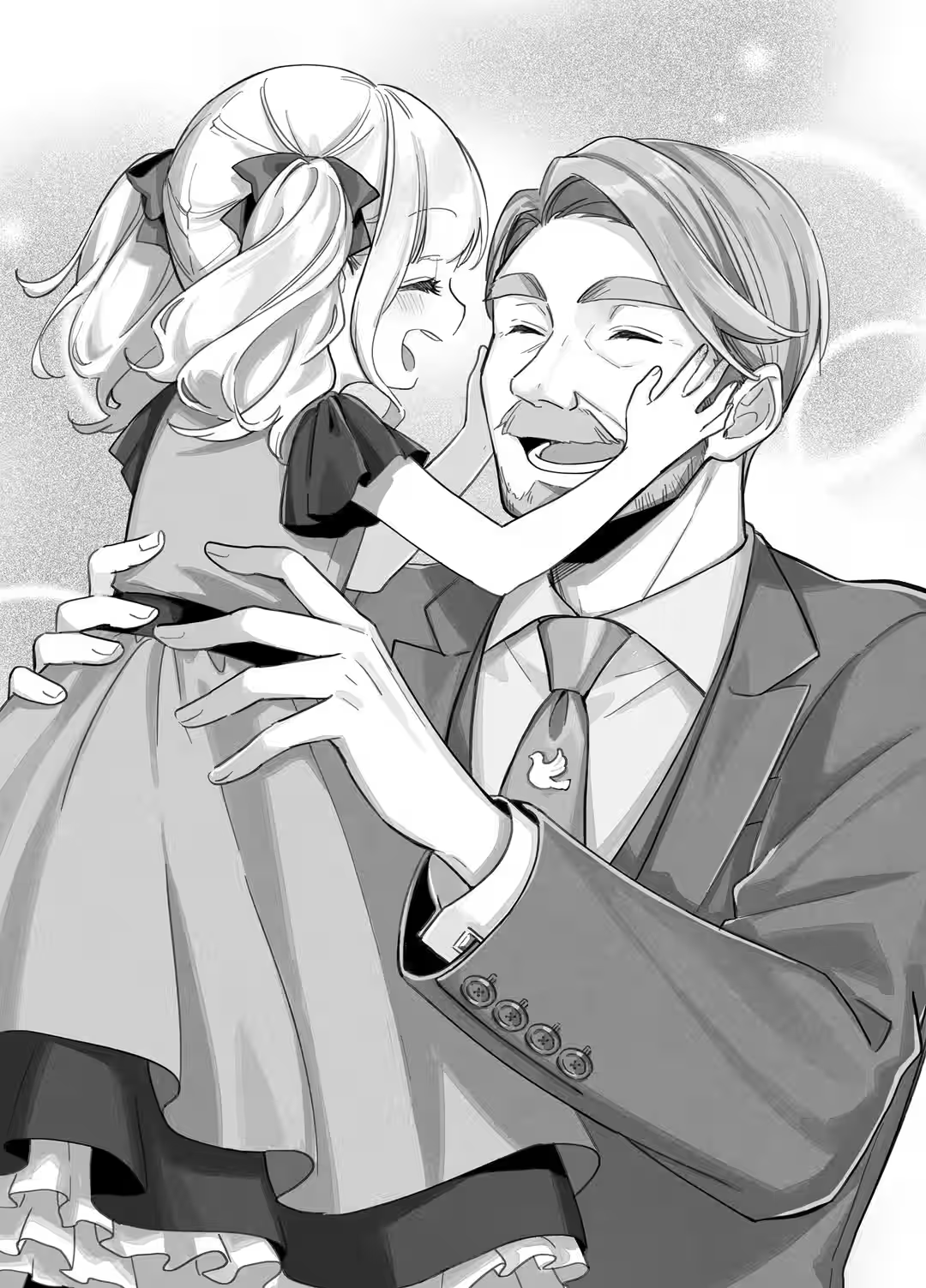
The noblewoman standing beside him must’ve had very sharp eyes. “My,” she muttered to herself before speaking in her normal voice, “your jacket is superb, but the lining is especially charming. By whom did you have it made?”
“It was by a couturier with whom I am acquainted. You see, this lining matches my wife’s gown,” Seward said, showing off the smile that he had cultivated as a nobleman and diplomat. The extent of matching items between a married noble couple was limited to bracelets, rings, and earrings, though gowns and tailcoats may share the same fabric and color or one might wear an accessory that was the same color as their partner’s outfit. It would not be a surprise for anyone to be surprised at a man like Seward wearing a jacket with the same floral pattern as his wife’s clothes.
As expected, the noblewoman opened her eyes wide in shock. Was she going to give him a compliment laced with poison? Was she going to laugh outright? As he prepared for the worst, she clasped her hands in front of her chest and beamed. “Oh, how absolutely wonderful! I ought to have my husband do the same with me.”
Another noblewoman’s voice was filled with envy. “That you cannot bear to be parted with her, that you wish her never to be far from your thoughts—I can tell just how much you must love your wife!”
“Y-Yes, I suppose that is true...” Seward could not and would not deny his love for his wife, but he hadn’t expected words so schmaltzy.
“I would love to press you for more details!”
“The embroidery is so very beautiful! May I know who made it?”
“What a lovely pattern! You mentioned that your wife has a dress with the very same?”
Before he knew it, a throng of noblewomen old and young had approached him; Seward had not been surrounded by so many women since his debut as a young man—though it must be said that in that case, they were all his relatives. He chose his words deliberately and explained the lining on his jacket and how his wife was recuperating in the territories—his younger brother ran the earldom single-handedly, and she was in the countryside with the sister-in-law at a thermae to beautify their skin, so “recuperating” could hardly be considered incorrect.
“My wife will be visiting the capital before long, and if you ladies are planning on a gathering, I hope you will please keep her in mind.”
Let it be known that everything Seward had said, from the story about recuperating in the territories to this request, had come from the creative mind of his wife. He had felt guilty about all the clothing business happening behind her back, and so he had sent her a letter by pigeon and received back a letter with the machinations spelled out in words as fine as wheat berries. She had been famous for her brilliance since her college days, but even having known her as long as he had, he was impressed anew. She had also expressed concerns about a floral gown being ostentatious for her, but the couturier Lucia had already prepared for that possibility, and the design was very contemporary, with only splotches of the embroidered fabric. The earl had shown the countess, and with her approval, work on the gown had been set into motion.
Truth be told, Seward could not wait for his wife to return to the capital. More than anything, he wanted them to be dressed in matching outfits as they sipped on drinks, reminisced about their past, and spoke of their forthcoming journey to Ehrlichia.
He glanced at the lining of his jacket, and a smile welled up from the bottom of his heart.
“Can you imagine how much love he has put into the lining?”
“I envy his wife...” Similar words and sighs were sprinkled throughout the evening.
The man kept to himself but would fondly smile whenever he looked at his jacket—though his wife was not in attendance, his love for her was ever present. Despite being an earl, Seward had but the one wife—in Ordine, where one could have a second, a third, and even lovers outside of marriage, how true to her was his heart.
The other noblewomen weren’t envious of Seward but his wife, although some noblemen understood his feelings too. “Beautiful flowers on the lining is a great way to prevent any cheating from happening.”
There were those of a different camp too. “It must have been his wife’s idea to make herself known to everyone he meets.”
“No, it has to be her admonition against him sticking his nose in other flowers.” The debate continued over flowing alcohol.
But because the design was so versatile, there were soon many more requesting the same. Men’s evening dress and suit jackets lined with beautiful flowers bloomed everywhere. The custom of casually wearing the same thing as a couple or as sweethearts was just elegant enough to become popular among the nobility. As such, the Tailors’ Guild became swamped with work, and they then dealt in many varieties of floral-patterned fabrics and even increased their production.
Later, it would become a trend for noblemen who were single to choose floral linings for themselves. To pretend as though they had partners only made them less likely to find love, but in time, it would become a source of pride. Before long, nobles of all genders would wear jackets lined with all kinds of patterns. Finally, vests and shirts would be made with these bright patterns on the outside—but that wouldn’t be for quite some time.
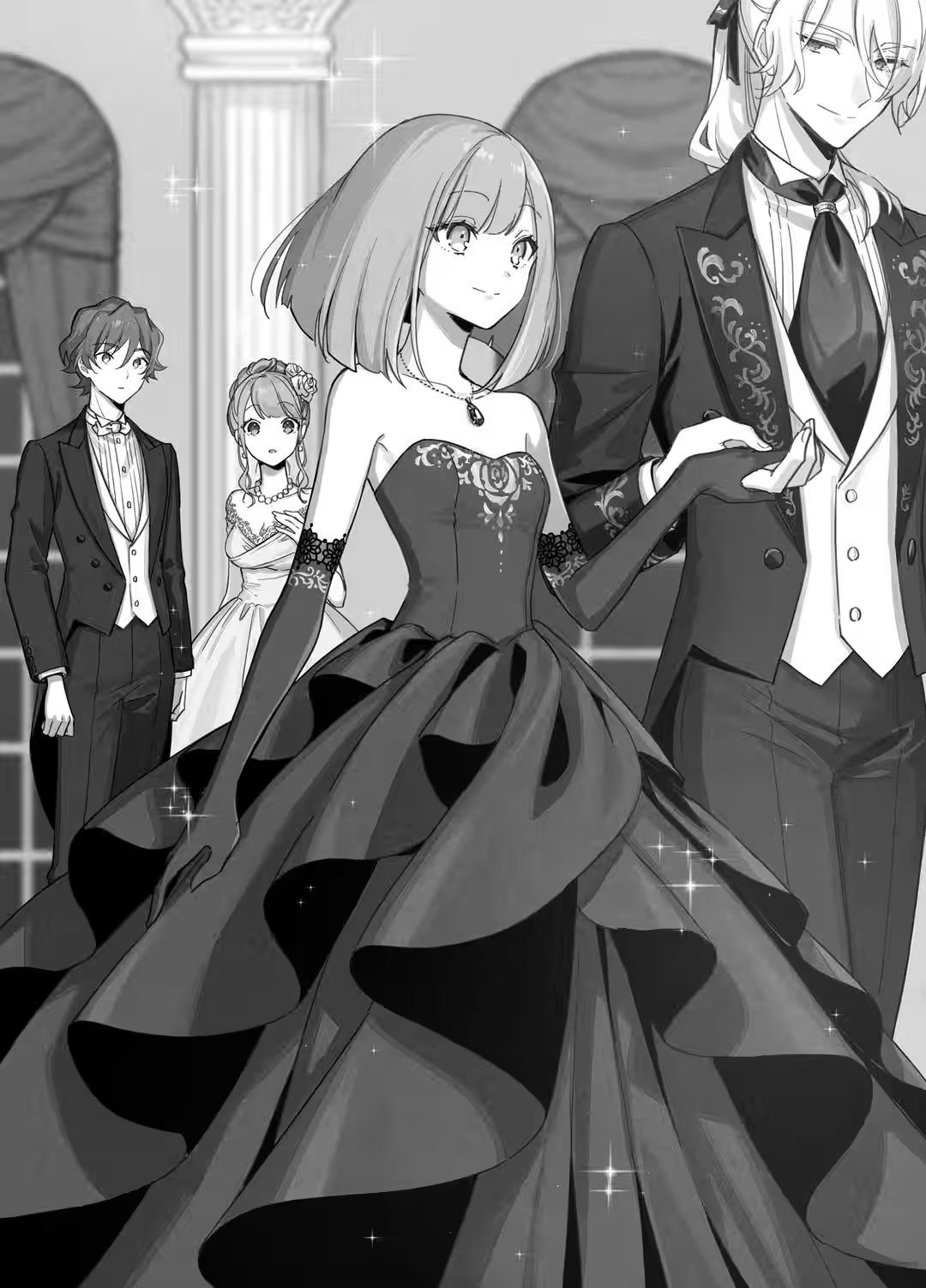
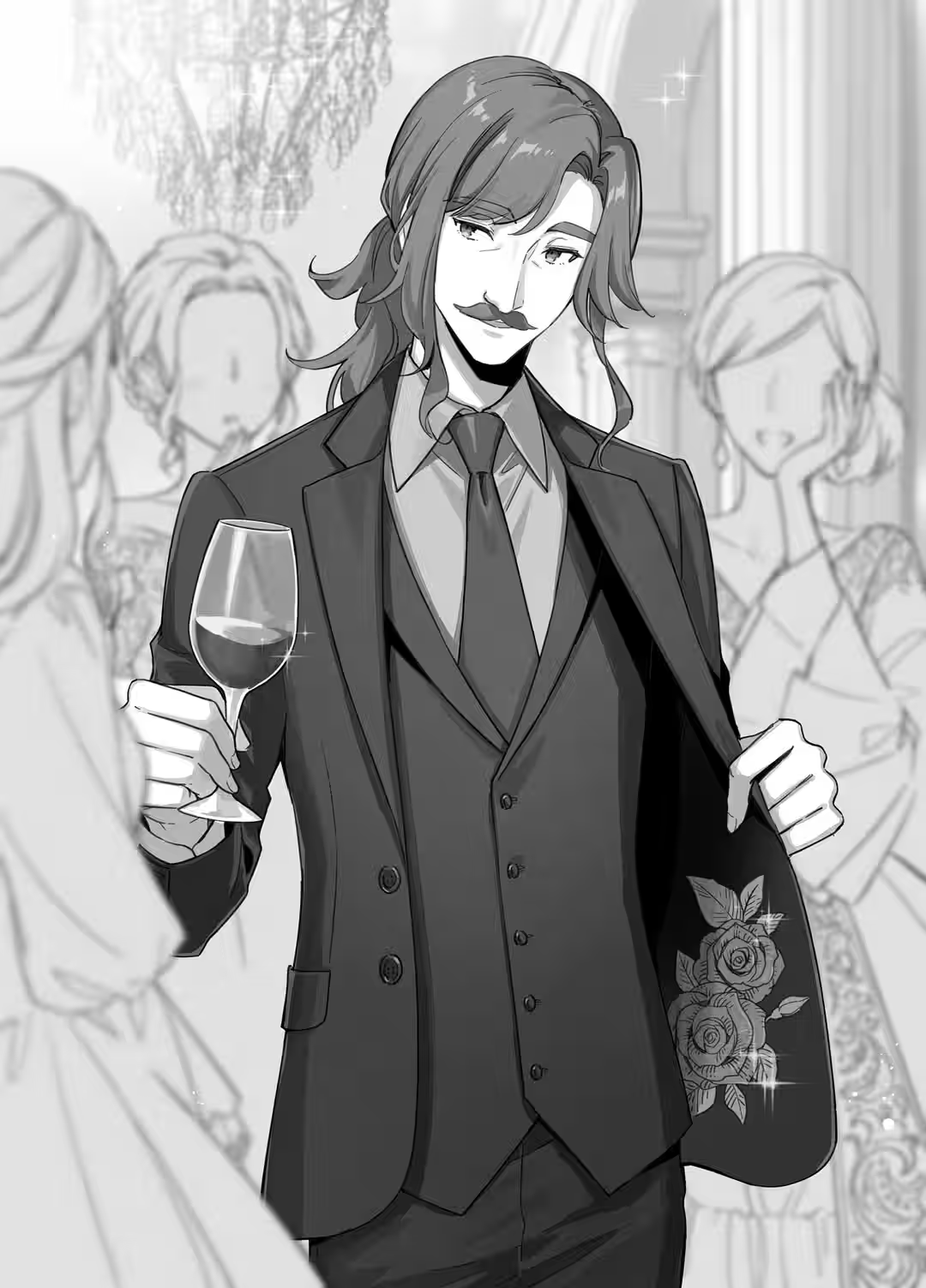
In this county, an embroidered handkerchief was a noblewoman’s declaration of her first love. Blue thread, however, was an expression of friendship and deep affection, as well as a wish for the health and fortune of someone who was dear to the sender. But that intimate gift was usually given by family, relatives, or friends, and Jonas had never received something like that. That much should have been obvious; there was no one in his life who would wish him those things. When he had been young, his mother had tried to do blue stitching, but it had instead dyed her fingertips red. In the end, he had pleaded, “Mother, just the sentiment is plenty!”
Jonas’s memory had pried his mouth into a smile, but then he suddenly realized something. “Blue...”
Up until now, his mother’s letters had always been written in black ink, yet the one he had received the other day had vivid blue letters. It was as if to symbolize blue embroidery stitches—rather, what else could it have been but his mother praying for his health and fortune?
He kept the handkerchief that the little girl had given him; it might be the first and last embroidered handkerchief he’d ever get. What with the stitching, so carefully and beautifully done, it was nothing short of valuable. Jonas decided to tuck it, along with the letter from his mother, safely away in the locked box under his bed.
Though there was one regret that pained him every time he revisited that memory. “I should have asked for her name...”
